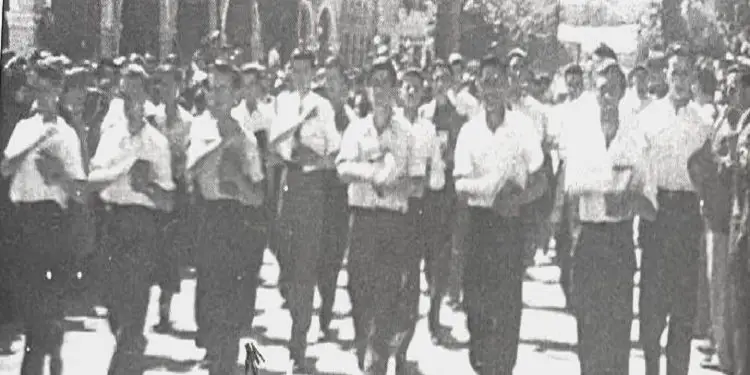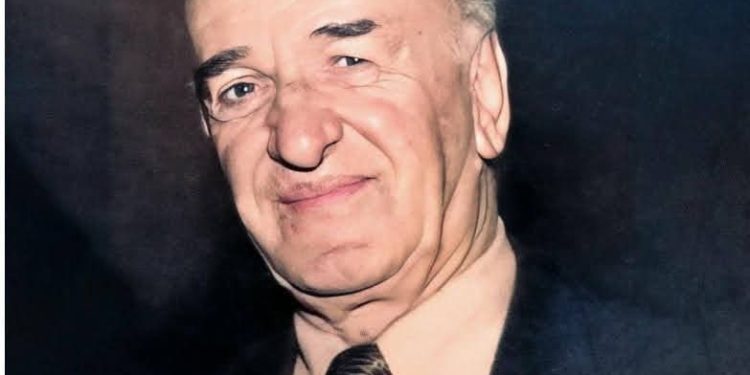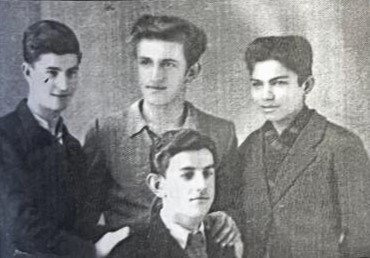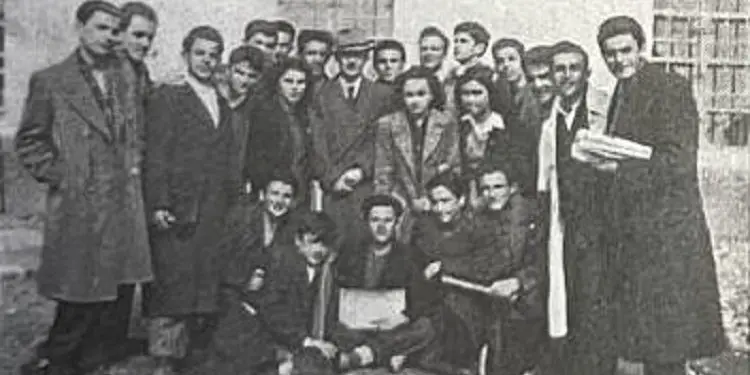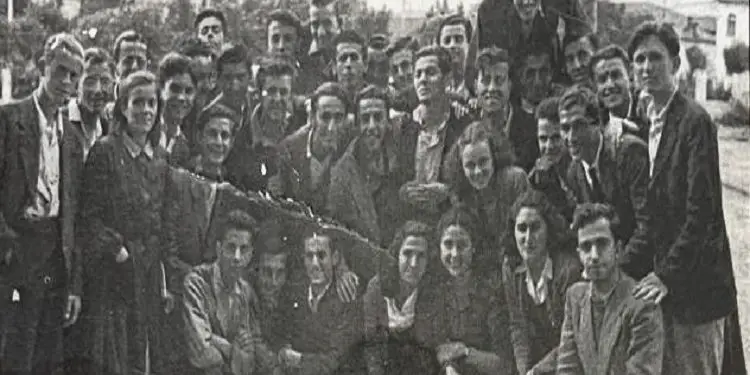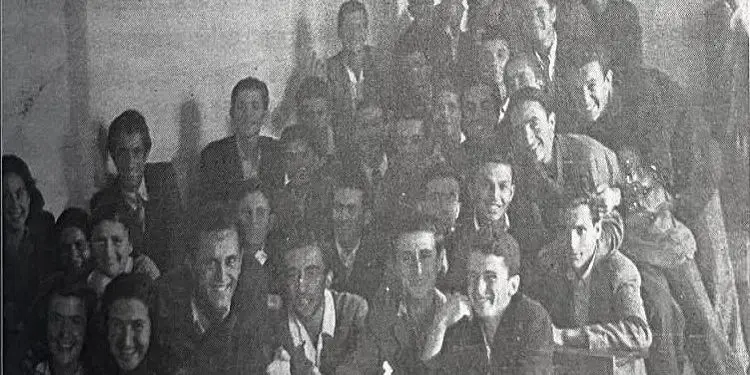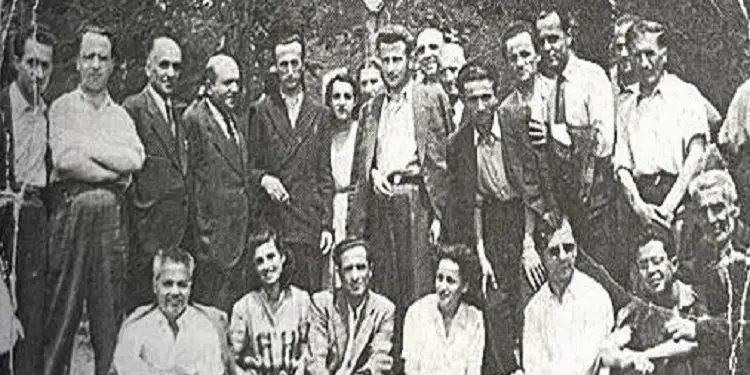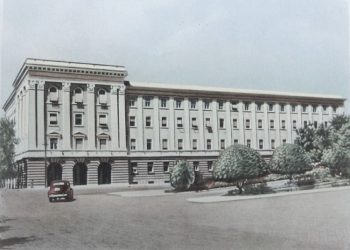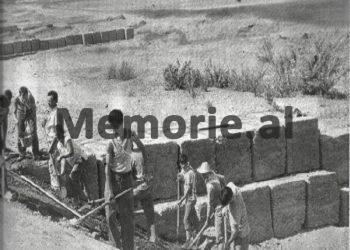By Ahmet Bushati
Part twenty-five
Memorie.al/After the flag was altered in 1944 with the addition of the communist star, Shkodra transformed into a center of resistance against the regime, paying a high price for its tradition of freedom. By April 1945, high school students, already feeling betrayed by the promises of the war, gathered to oppose the new terror that imprisoned and killed innocent people. Communism turned Kosovo into a province of Yugoslavia, while Shkodra was punished for its “historical crime”- its defiance against invaders. The “Postriba Movement” became a tool to suppress all dissent, plunging the city into an unprecedented spiral of suffering: imprisonments, executions, and the destruction of families. The high school students, alongside citizens, became symbols of resistance, while some “young communists” turned into tools of the State Security, leading to expulsions, imprisonments, and internments.
Four times, Shkodra rose in armed rebellion, but history forgot these battles. This book is written to remember the countless prisoners, the tortured, the killed, and the parents who suffered in silence. It is a warning against dictatorship and a plea for future generations not to forget the sacrifices made for freedom.
Continued from the previous issue
In the Footsteps of a Diary
Shkodra in the first years under communism
The Anti-Communist Movement of the Shkodra High School
Meanwhile, the educational reform was also being carried out in the school which was overthrowing the entire previous school system. The major figures of literature, such as Fishta, Konica and his friends, who until then had been the spiritual construct of our nation, would be denigrated and anathema, and their work, which had so much influenced the molding of our people with national ideals, would also be arrogantly denigrated at that time, and their work would be excluded from the program, for its reactionary, irredentist and even showy character that it was said to have.
European and world culture, declared bourgeois and obscurantist, would also deny them. “Socialist realism” would be introduced into literature, which was nothing more than a chronicle of the regime. The Italian and French languages, which we had been learning for many years, would be ruthlessly removed from the curriculum, to be replaced by the Slavic language of the backward Russians, which would begin with its famous “Cyrillic”, a language that time has proven to be generally neither wanted nor ever taught properly!
As our first teacher of the Russian language, we would have a certain Gina Alexandrovna, profoundly peasant in origin and manners, although, as a contrast, she would artificially wear a black top hat on her head. One day, some of our classmates would go to visit this Ghina, and after returning scandalized by what they had observed there, they would tell us: “She was completely rustic! She welcomed us with open arms, even though we had informed her about the visit, and with two dirty children in her arms. How much food she had!!! They were sloppy, with tin cans”!
The school’s ethics considered formal and always bourgeois, was communist equality, which did not recognize hierarchy even in the case of teacher-student relations. The professors were no longer allowed to be called by the titles “sir”, “madam”, or even “miss”, as the case may be, but simply by their given names without any distance. Communist students in the classroom, as if they were ordered, for psychological pressure on the professors and the students, as if they were sheep that had to be returned, would arrogantly ask the literature professor, – in our case Prof. Filip Ndocaj -, to read in front of the class the essays of the students known as opponents, as well as to show the grade with which he had evaluated them.
After lunch on December 11, 1946, down in the large gymnasium, Spiro Pano, first secretary of the Party Committee, came to us, who, among other things, would pronounce sharply and nervously: “The sons of the people must take their school to where it is needed, for the good of the broad masses of the people. Other students will have no place in our school. You cannot remain indifferent to the numerous wounds of our people. To remain indifferent like this means committing a crime, and crime is punished”!
His direct allusions would be clear and warning for us students who had been compromised since last year. He would end his intelligent and concise lecture, with a pure minority accent and with tones that showed more determination than nervousness, with the words: “Just as water that boils at a hundred degrees will not boil, so too, we tell some here that when the cup is full, prison awaits you”! There could not have been a clearer warning.
Meanwhile, a certain Marian Zhagar, on his regular and serious to the point of sadness, on whose face one would notice a pair of full and very black mustaches, was a figure of Yugoslav espionage in Albania, disguised under the title of Yugoslav advisor to our Ministry of Education in Tirana. This enigmatic man, always with a gloomy appearance, would come regularly, twice a week, to Shkodra to teach Slavic and Russian languages at the gymnasium and, in his free time, he would always be seen walking with Ferit Mandina, a Sigurimi man, but also one who knew Marian’s language.
The war against students, generally by the dormitory staff, but also by some others – blind tools of the Sigurimi power – during the school year ’46-’47, would take on a strongly aggressive character. Our pursuit was increased to the maximum. They would control our every movement, both during the day in the sun and in the dark of the night, outside and even inside our homes. There were times when they would sneak into our courtyards at night to see who was coming in and out, and they would stay for hours under our bedroom windows, listening to see if we were listening to “Radio London” and “Voice of America,” which at that time were talking a lot about serious violations of freedoms and human rights by the communist government.
From time to time, groups of opposing students would be expelled from the youth organization and partly from the school as well. The expulsions of opposing students were carried out through a kind of police “ceremonial”: the entire school would gather in the gymnasium, and there, one after the other, the communist youth would discredit the students who were to be expelled on that occasion. No objections or apologies, no matter how small, could even be imagined. They had repeatedly declared and would continue to declare: “The doors of the prisons are open to anyone.”
Until we were imprisoned, the following students were excluded from the youth and school during that school year: Gjylter Pipa, Sadush Ulqinaku, Faik Luli, Xhevat Quku, Sander Gera, Njazi Barbullushi, and only from the youth, Shyqyri Ahmetaga, Thabit Rusi, Hamdi Omari, Xheudet Vjerdha, Fuat Zajmi, Abdulla Miloti, Pashko Luka, Ahmet Bushati, Qazim Borshi, Asime Pipa, Linda Boriçi, Dodona Karafili, Marije Rranxi, Suzana Laca and some others. And, here, for example, is one of the announcements about those expelled from school, which were issued at that time through the directorate:
People’s Republic of Albania
Death to Fascism
Freedom of the People
No. Prot. 194/II
The security, especially during this period, would help them through a network of agents placed in schools, assigned to each age and class. Those expelled from school would not be allowed to live at all and would remain as prisoners inside their homes, without ever losing sight of the possibility of imprisonment, while those expelled from the “Youth Organization” would be allowed to continue school, but as they turned into “heretics” of the government, they would carry with them a danger to anyone who approached them. They were forced to remain isolated and alone, inside and outside the school.
The last in the class line in the schoolyard, alone and on the last benches inside the classroom. The association of a person with someone expelled from the Youth organization would be considered flagrant and sufficient proof of his oppositional stance. In the house of a friend or a girlfriend expelled from the Youth, – let alone from school – one had to be careful to go only at night, and even then, looking back and forth to make sure no one was watching. It was then that the “hegemony” of persecution for many students was present everywhere.
It, like an evil shadow, would follow us to our beds, and it cannot be said that as a result of the great pressure, the personality of any student would not be shaken, that is, that there were no students who would turn into cowards and hypocrites on that occasion, but that nevertheless, the truth for most of them was that many of the students, under the example of the best boys and girls, would continue to maintain dignity in their opposition to the regime, and play among themselves, despite the smiles and enthusiasm of a year earlier, which that high school would have lost, as a result of the frightening ghost of the Security that wandered around the students without any success, both back and forth.
Even the student Hamit Beqja himself, one of the leading communist youth at that time, describing the period we are talking about years later, would express in the press: “At this time, a wide and sharp class struggle took place in the gymnasium, which also took harsh forms, with a pronounced political character” and would continue to add: “The reactionary forces in the school were active. An important support in this struggle was the youth of the dormitory”!
The events of that school year, perhaps directed and controlled by a reliable Shkodra student headquarters, which had never declared itself, would be carried out by some dormitory students, whose behavior, vulgar and adventurous, would reflect the combination of a certain provincialism of theirs with the communist fanaticism they had acquired, or typical hooliganism, as would be the case of a Hajredin Çeliku from the city of Tirana or Elbasan, who stood out above all the others.
The rebellious attitude of those boarding students would leave an indelible stain of ugliness on the bright background of a historically glorious high school, such as that of Shkodra, and, just as the earth does not cover the dead for every evil deed they may have committed in life, so too, time has proven and continues to prove that nothing has forgotten or forgiven the protagonists of those shameful events, because it would be those boarding students and those few young communists from Shkodra who, contrary to the noblest inclinations of the majority of students, would, with irresponsibility and arrogance, seek to build their happiness on the misfortune of those with whom they had been classmates for years.
Xhevat Quku’s fight with the dormitory guards, before they expelled him from school, would go down in history as a model and symbol of the most dignified opposition to the arrogance of the dormitory guards and their hated power, both by the students and the people. I don’t know if these former students, our persecutors, during their time studying in universities, busy with work and a good life, ever looked back, towards their former “deeds” and “victims”, and if so, what did they try? Did their consciences suffer even the slightest bit on that occasion? And if so, how could it have spoken to them? Because after all, times are changing and the days are coming when we, the survivors of the dictatorship, will write and tell.
Somewhere around June of that year, four of our friends were arrested: Injac Serreqi, Gjon Kovaçi, Vitor Kujxhia and Çesk Hilgega, respectively the first two from our 5th grade and the other two from our 4th grade. It had been two years since Xhevat and I had talked about the need to connect with the Tirana high school. When, towards the end of the school year, we were told to choose between going “volunteer” in the construction of the Durrës-Peqi railway or, cultural brigades in Malsi, I preferred the railway, hoping that I would find the Tirana high school there as an opportunity to take advantage of.
Unfortunately, the Tirana high school had another destination, but there, somewhere before reaching Peqin, where we were stopped, we would find the Durrës high school and the ‘Normal’ of Elbasan. As a few days passed, some good boys from Durrës would approach us, such as Ramazan Kthupi, Mas’har Kapidani, Muntaz Bakiri, Leka Dosti, the Vehbi and Agim Dermani brothers, Ruzhdi Cara and some others, with whom the time of more than three months had been enough for us to get to know each other and become friends. In the last days of our stay there, I would open up to Ramazan Kthupi and ask him, in a very confidential and conspiratorial way, if he saw the possibility of creating a group in the Durrës high school, with the above-mentioned people?
Zani, for his part, would show he ready and willing to accept my proposal, telling me that he believed that the formation of a group with the persons in question should be a matter of days. We talked about the initial forms of work, using our Shkodra practice as a model, and emphasized the great need for conspiracy, giving our word that the connection between us would remain secret. Zani also undertook to establish my connection with a good friend of his at the Tirana gymnasium. In order to have time for everything, we set the next meeting for April 30 of the following year in Tirana, as the day of the May Day holiday, which they wanted to disguise our meeting, which, unfortunately, they would not be able to do, since I would have been arrested as early as January.
On one of the last days of our stay in the camp, Tinka Thani, returning from Shkodra, where she had gone on leave for a few days, would bring with her the bitter news of Qemal Draçini’s death, which, as we have shown, would have the effect of a real shock to me, and to anyone else there.
On October 28, 1947, we left the voluntary labor camp at the entrance to Peqin and returned to Shkodra, where we naturally found an atmosphere charged with new and, as always, shocking events, including, among other things, the death of one of my aunt’s sons, Xhemal Juka, who, as we have already mentioned, in order to escape the unbearable suffering, had ended his life by cutting his veins and stomach with a piece of glass, and had died on the same day with Qemal Draçin, whose lifeless bodies, a cartload of garbage, had been thrown somewhere by one of the many excavations that the famous Zallë i Kirit had, which for almost three years had been turned into a cemetery without graves.
Meeting with Bardhosh Dani
Time passed and one day, around mid-December, during one of the breaks between classes, Bardhosh Dani approached me, asking me to meet him that afternoon. Despite the two-year age difference we had, we had grown up together like two brothers. When we met after lunch, Bardhosh immediately got to the point: “Ahmet, I am convinced that you are carrying out activities against ‘these’, although I am not asking you to tell me anything. Some friends and I have formed an organization called ‘Albanian Effort’, we are young and inexperienced and we need someone to lead us. I thought of you”!
I was hesitant to answer Bardhosh right away, and as if to gain time, I started asking him about the activities they were carrying out. They were so young and naive, as dangerous as the situation was. Without an older leader, they could not be politically useful, regardless of their admirable will and courage. Two years earlier we had been that age, but with more experience that we had carried over from the war, the difference with them was great.
Not to be long, Bardhoshi, among other things, told me that they had made a decision that in the coming days, slogans against the government would be written on the walls of the gymnasium, something for which they had also done two preliminary tests, each having practiced in the task that they would have on that occasion, both those who would write the slogans, as well as those who would give the signal in case of discovery, as well as others who were considered their protectors, equipped with some strong iron tools.
I opposed their action on the grounds that by doing so, they would expose themselves to the Sigurimi, who would make their mission more vigilant and severe than it had been until then. As far as I remember, he told me that at every meeting they sang a hymn with oath notes, for war and loyalty. After my advice, Bardhoshi finally relented, and promised me that at least temporarily, he would stop the action in question, but that nevertheless, the slogans “Down with communism”, “Out with the rebels”! etc., would adorn the walls of the gymnasium entrance, no later than three or four days after my meeting with him. And it happened just as I had warned Bardhoshi:
But after another five or six days, my two friends, Remzi and Xhevat Quku, were arrested, along with Xhevat’s younger brother, Osja, who, due to his age, would be released after two or three days of being held under investigation. Remzi would be arrested in the school hallway, as he was leaving for recess after a class. They would immediately search him, and from the corners of his greatcoat, which, as per the rules, had been hung in the hallway, they would pull out some compromising leaflets, which the Sigurimi himself, using his tools at the gymnasium, had previously shoved into his pockets, and then, in front of many students present, they would say to him ironically: “Do you want to put a piece of paper in your hands?”
In the meeting with Bardhoshi, the dilemma between “duty” and “prudence” was finally resolved in favor of the former, that is, I accepted cooperation, on condition that none of his friends would ever learn of his connection with me. When I met Bardhoshi two days after the slogans were written, he would justify them by saying: “I could not stop my friends from that action for which they were spiritually very prepared. Any intervention of mine was completely useless, because they had decided to carry out that action”!
I had entrusted the hope of creating the “Durres Group” to Xhevat, having also made known to him the name of Ramazan Kthup, which the Sigurimi would never take into account, while the connection with Bardhoshi, or who had written the slogans, – for which he would unfortunately end up in prison – I had not told him, as always for conspiratorial reasons. After two or three years in prison, in a conversation with one of Bardhoshi’s most trusted collaborators, Et’hem Bakalli, I would learn that Bardhoshi, after my arrest, had interrupted the group’s meetings for some time, until one day later, he had gathered them again, having said to him:
“As long as we don’t suffer anything, it seems that Ahmet Bushati is resisting and we are continuing the work we have started”! Regarding the activity of the group that bears the name of Bardhosh Dani, Et’hem Bakalli, one of his closest collaborators, on the occasion of the seventieth anniversary of the Shkodra gymnasium, would submit to the commission established for the organization of this anniversary, the statement drafted in collaboration with some of the former members of the “Albanian Effort” organization, in which he had participated:
“In October 1947, the ‘Albanian Effort’ organization was formed in the house of Nihat Bakalli. The activity of this organization was intense and multifaceted. Its first act would be the writing of slogans on the walls of the gymnasium. The ink for writing the slogans was prepared by Myseret Muka, in the shop of the patriot Visho Barbullushi. With the arrest of the graduates with whom Bardhosh Dani was connected through Ahmet Bushati, the situation in the gymnasium worsened so much so that the organization’s activity was forced to go outside the school walls. In January 1948, through the mediation of Viktor Luka, this organization was connected to the ‘social-democrat’ group headed by Mark Shllaku.
After the murder of Bardhosh Dani, in August 1948, together with Brahim Dërguti and Mark Cacë, while crossing the border, the organization reorganized itself in the homes of Alfons Radovan and Viktor Luka. They printed three tracts, the first on the occasion of 28th of November 1948, again on 28th of November 1949, and the third time on 7th of April 1950, in which, among other things, they would say that; 29th of November for our people was the same as 7th of April 1939”. Since Mërgim Dani’s typewriter could not cope with the needs of the organization on several occasions, a second typewriter was also considered. Memorie.al




